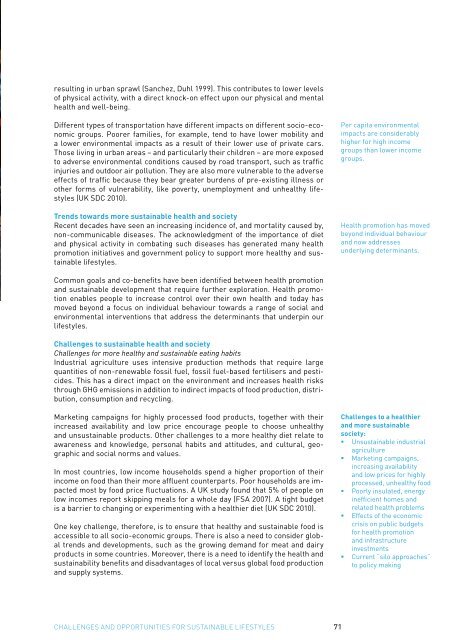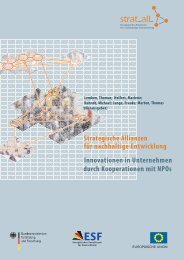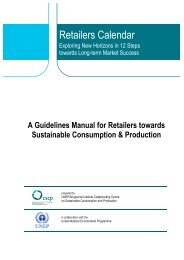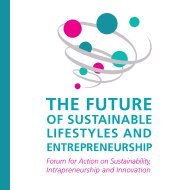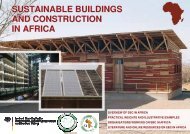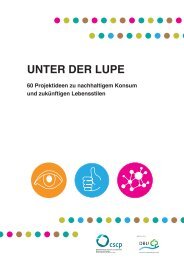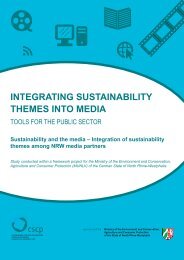today's facts & tomorrow's trends - SPREAD Sustainable Lifestyles ...
today's facts & tomorrow's trends - SPREAD Sustainable Lifestyles ...
today's facts & tomorrow's trends - SPREAD Sustainable Lifestyles ...
Create successful ePaper yourself
Turn your PDF publications into a flip-book with our unique Google optimized e-Paper software.
esulting in urban sprawl (Sanchez, Duhl 1999). This contributes to lower levels<br />
of physical activity, with a direct knock-on effect upon our physical and mental<br />
health and well-being.<br />
Different types of transportation have different impacts on different socio-economic<br />
groups. Poorer families, for example, tend to have lower mobility and<br />
a lower environmental impacts as a result of their lower use of private cars.<br />
Those living in urban areas – and particularly their children – are more exposed<br />
to adverse environmental conditions caused by road transport, such as traffic<br />
injuries and outdoor air pollution. They are also more vulnerable to the adverse<br />
effects of traffic because they bear greater burdens of pre-existing illness or<br />
other forms of vulnerability, like poverty, unemployment and unhealthy lifestyles<br />
(UK SDC 2010).<br />
Trends towards more sustainable health and society<br />
Recent decades have seen an increasing incidence of, and mortality caused by,<br />
non-communicable diseases. The acknowledgment of the importance of diet<br />
and physical activity in combating such diseases has generated many health<br />
promotion initiatives and government policy to support more healthy and sustainable<br />
lifestyles.<br />
Per capita environmental<br />
impacts are considerably<br />
higher for high income<br />
groups than lower income<br />
groups.<br />
Health promotion has moved<br />
beyond individual behaviour<br />
and now addresses<br />
underlying determinants.<br />
Common goals and co-benefits have been identified between health promotion<br />
and sustainable development that require further exploration. Health promotion<br />
enables people to increase control over their own health and today has<br />
moved beyond a focus on individual behaviour towards a range of social and<br />
environmental interventions that address the determinants that underpin our<br />
lifestyles.<br />
Challenges to sustainable health and society<br />
Challenges for more healthy and sustainable eating habits<br />
Industrial agriculture uses intensive production methods that require large<br />
quantities of non-renewable fossil fuel, fossil fuel-based fertilisers and pesticides.<br />
This has a direct impact on the environment and increases health risks<br />
through GHG emissions in addition to indirect impacts of food production, distribution,<br />
consumption and recycling.<br />
Marketing campaigns for highly processed food products, together with their<br />
increased availability and low price encourage people to choose unhealthy<br />
and unsustainable products. Other challenges to a more healthy diet relate to<br />
awareness and knowledge, personal habits and attitudes, and cultural, geographic<br />
and social norms and values.<br />
In most countries, low income households spend a higher proportion of their<br />
income on food than their more affluent counterparts. Poor households are impacted<br />
most by food price fluctuations. A UK study found that 5% of people on<br />
low incomes report skipping meals for a whole day (FSA 2007). A tight budget<br />
is a barrier to changing or experimenting with a healthier diet (UK SDC 2010).<br />
One key challenge, therefore, is to ensure that healthy and sustainable food is<br />
accessible to all socio-economic groups. There is also a need to consider global<br />
<strong>trends</strong> and developments, such as the growing demand for meat and dairy<br />
products in some countries. Moreover, there is a need to identify the health and<br />
sustainability benefits and disadvantages of local versus global food production<br />
and supply systems.<br />
Challenges to a healthier<br />
and more sustainable<br />
society:<br />
• Unsustainable industrial<br />
agriculture<br />
• Marketing campaigns,<br />
increasing availability<br />
and low prices for highly<br />
processed, unhealthy food<br />
• Poorly insulated, energy<br />
inefficient homes and<br />
related health problems<br />
• Effects of the economic<br />
crisis on public budgets<br />
for health promotion<br />
and infrastructure<br />
investments<br />
• Current “silo approaches”<br />
to policy making<br />
Challenges and opportunities for sustainable lifestyles 71


